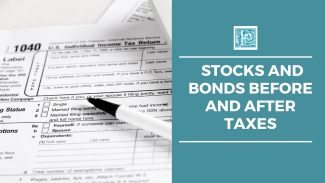
Stocks and Bonds Before and After Taxes
Managing Investment Returns with Tax-Efficient Strategies
Investing in U.S. stocks and bonds is a popular way for individuals and institutions to grow their wealth and generate income. However, it is important to consider the impact of taxes on these investments before and after making them. In this article, we will discuss the various tax implications of investing in U.S. stocks and bonds and provide some strategies for managing the impact of taxes on your investment returns.
First, at the tax implications of investing in U.S. stocks. When you purchase a stock, you are buying a share of ownership in a company. The value of the stock can go up or down, depending on the performance of the company and the overall stock market. If you sell the stock for a higher price than you paid for it, you will have a capital gain, which is subject to capital gains tax. The tax rate on capital gains can vary depending on how long you held the stock and your income level, but it is generally lower than the tax rate on ordinary income.
However, there are some strategies you can use to mitigate the impact of taxes on your stock investments. One strategy is to hold onto the stock for at least a year before selling it, as the tax rate on long-term capital gains is generally lower than the rate on short-term capital gains. Another strategy is to invest in tax-efficient stock funds, which are designed to minimize capital gains distributions and maximize dividends.
In addition to capital gains tax, investors in U.S. stocks also have to pay taxes on dividends. Dividends are payments made by a company to its shareholders out of its profits. Dividends are subject to ordinary income tax, and the rate can vary depending on your income level.
You can manage the impact of taxes on dividends with an appropriate strategy, such as investing in tax-efficient stock funds or holding your stocks in a tax-advantaged account like a Roth IRA.
Now let's take a look at the tax implications of investing in U.S. bonds. When you purchase a bond, you are lending money to a company or government entity. In return, the bond issuer pays you interest on the bond. The interest is subject to income tax, and the rate can vary depending on your income level.
There are a few strategies you can use to manage the impact of taxes on bond investments. One strategy is to invest in municipal bonds, which are issued by state and local governments. The interest on municipal bonds is generally tax-free at the federal level, and may also be tax-free at the state and local level. Another strategy is to invest in bonds in a tax-advantaged account like a Roth IRA.
Generally speaking, investing in U.S. stocks and bonds can be a great way to grow your wealth and generate income. However, it is important to consider the impact of taxes on these investments before and after making them.
There are also strategies to help you with managing the impact of taxes on your investment returns, such as holding onto your stocks for at least a year, investing in tax-efficient stock funds, and holding your bonds in a tax-advantaged account like a Roth IRA. By being aware of the tax implications of your investments and taking steps to mitigate them, you can manage your investment returns and pursue your financial goals.
Important Disclosures
The opinions voiced in this material are for general information only and are not intended to provide specific advice or recommendations for any individual. To determine which investment(s) may be appropriate for you, consult your financial professional prior to investing.
This information is not intended to be a substitute for specific individualized tax advice. We suggest that you discuss your specific tax issues with a qualified tax advisor.
Investing in stock includes numerous specific risks including: the fluctuation of dividend, loss of principal and potential illiquidity of the investment in a falling market.
Bonds are subject to market and interest rate risk if sold prior to maturity. Bond values will decline as interest rates rise and bonds are subject to availability and change in price.
Municipal bonds are subject to availability and change in price. They are subject to market and interest rate risk if sold prior to maturity. Bond values will decline as interest rates rise. Interest income may be subject to the alternative minimum tax. Municipal bonds are federally tax-free but other state and local taxes may apply. If sold prior to maturity, capital gains tax could apply.
The Roth IRA offers tax deferral on any earnings in the account. Withdrawals from the account may be tax free, as long as they are considered qualified. Limitations and restrictions may apply. Withdrawals prior to age 59 ½ or prior to the account being opened for 5 years, whichever is later, may result in a 10% IRS penalty tax. Future tax laws can change at any time and may impact the benefits of Roth IRAs. Their tax treatment may change.
The payment of dividends is not guaranteed. Companies may reduce or eliminate the payment of dividends at any given time.
This article was prepared by FMeX.
LPL Tracking #1-05356376

